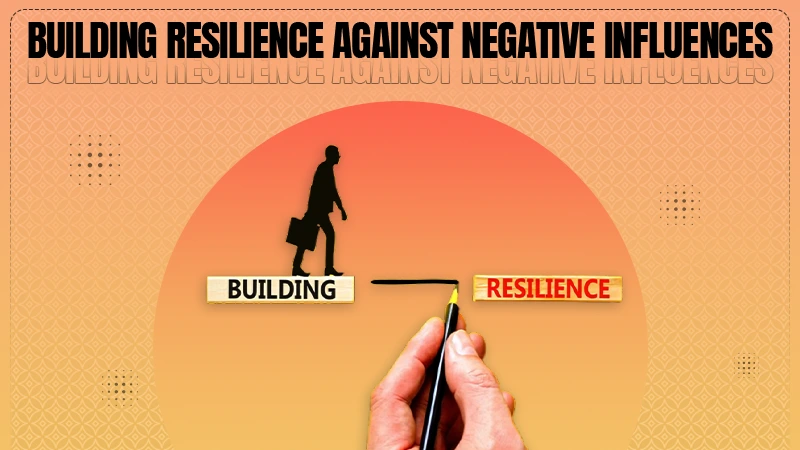
Negative influences are everywhere. They come in many forms—peer pressure, unhealthy habits, toxic relationships, or even addictive behaviors. While these influences can feel overwhelming, building resilience allows individuals to stay grounded and take control of their lives. This blog will explore practical strategies to strengthen your ability to resist negative influences and lead a healthier, more focused life. Whether you’re a student, a working professional, or someone recovering from challenging habits such as pornography addiction recovery, these tips will help you maintain clarity, purpose, and motivation.
Resilience is the ability to adapt and thrive despite adversity or challenging circumstances. Think of it as a mental muscle that helps you bounce back from setbacks while remaining steadfast in your principles and goals. Developing resilience is key to maintaining well-being and personal growth in a world filled with distractions and negative influences.
When you build resilience:
Before you can overcome negative influences, you must first identify them. Negative influences can often be subtle, making them harder to pinpoint. Here are some common types:
Certain people in your life may drain your energy, steer you away from your goals, or encourage unhealthy behaviors. These could be coworkers, friends, or even family members.
With increased screen time, the digital world has become one of the most significant sources of distraction and negative influence. Social media platforms, binge-worthy streaming services, and harmful online habits can sap your productivity and self-esteem.
The desire to fit in or meet others’ expectations can push you toward making choices that conflict with your values and long-term goals.
Many turn to unhealthy coping mechanisms like excessive alcohol consumption, smoking, or distractions like pornography to deal with stress or emotional pain. Over time, these coping mechanisms can trap you in cycles that are hard to escape.
Resilience is not something you’re born with; it’s a skill that can be developed and strengthened. Here are proven strategies to help you stay on course despite outside pressures and negative temptations.
Start by clarifying what matters most to you. Ask yourself:
When you have a clear sense of your values, you’re less likely to succumb to negative influences because you’ll know exactly what they stand to jeopardize.
They say you are the average of the five people you spend the most time with. Surrounding yourself with supportive and uplifting individuals can make a monumental difference. Look for friends, mentors, and colleagues who inspire and motivate you. Being in the company of positive role models will naturally reinforce your resilience by reflecting healthier behaviors.
Internal self-awareness—understanding your strengths, weaknesses, and triggers—is critical for resilience. Practicing mindfulness through meditation or journaling can help you observe how negative influences are affecting you emotionally and mentally. By recognizing these triggers, you gain the power to reclaim control instead of reacting impulsively.
Replacing negative habits with positive activities is one of the simplest ways to flee harmful influences. For example:
For those working through habits like pornography addiction recovery, adopting healthier hobbies and building a structured daily routine can be especially powerful for maintaining focus and making lasting changes.
Resilient individuals are comfortable with setting boundaries. Saying “no” when something conflicts with your values or goals isn’t selfish—it’s self-care. Practice being assertive and clear about your needs. Whether it’s declining a night out when you’d rather rest or refusing a request that overextends you, learning to say no strengthens your self-discipline.
When it comes to fighting negative influences, your mental health is a key ally. Resilient people actively manage their mental well-being by:
Be kind to your mind and body, and you’ll find it easier to handle life’s challenges with grace and confidence.
Building resilience doesn’t mean perfection. It’s about persistence and progress. Celebrate victories, no matter how small—be it resisting a temptation, successfully setting a boundary, or taking a step toward self-improvement. Recognizing your growth reinforces your capability to overcome challenges.
Building resilience against negative influences is one of the most empowering things you can do for yourself. By identifying these influences, understanding what drives your decisions, and practicing resilience-building strategies, you can set yourself up for greater success, fulfillment, and peace of mind.
Remember, resilience isn’t built overnight. It’s an ongoing process that requires patience, self-reflection, and support. Whether you’re a student navigating the complexities of peer pressure, a working professional battling workplace negativity, or addressing personal challenges like pornography addiction recovery, resilience is your greatest asset.
Take control today. Reflect on your values, surround yourself with support systems, and establish healthy habits. Life is full of opportunities—don’t allow negative influences to hold you back.